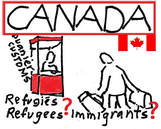Refugees: Myths and Facts #3
|

Myth #3: People crossing at Roxham Road are bogus refugees who are jumping the queue ahead of people who use the regular channels.
The Facts: First of all, each refugee claim is treated in order of arrival so no-one is able to jump the queue. Secondly, there are two channels – one for asylum seekers and another for immigrants. An increase in the number of people seeking asylum does not lengthen the time it takes for people trying to immigrate to Canada. They are two distinct procedures. While not everyone entering at Roxham Road is accepted as a refugee, that does not make them ‘bogus’. People coming from the USA or other places do not leave their homes, work, schools and loved ones to seek refuge in Canada on a whim. They know it is risky and that they may not succeed; but they feel they must try to find a safe place.
In 2017 the rate of refugee acceptance for people who entered irregularly was 53%, while the rate for all asylum seekers was 63%. While some ‘irregular’ nationals have low acceptance rates, it’s helpful to understand that the definition of a refugee found in the Refugee Convention is quite narrow. For example, though the majority of Haitians are being refused refugee status here, they do have genuine fears of being sent back to Haiti[i] after years of legal residence in the USA (this legal status will end in 2019 and appears to have been illegally removed by the Trump administration, contrary to procedures).[ii] Other nationalities have very high acceptance rates: Turkey 92% - Eritrea 92% - Yemen 95% - Syria 84% - Sudan 69% - Colombia 55%.[iii] Clearly many people crossing irregularly have strong claims for protection in Canada.
[i] Haiti is a country beset by corruption, human rights abuses, violence against women and ongoing humanitarian crises. See Human Rights Watch Report on Haiti. https://www.hrw.org/world-report/2018/country-chapters/haiti This Guardian article outlines how Canada was directly involved in deposing the democratically elected President Aristide in 2003 after his efforts to introduce real reform for his impoverished nation made him an enemy of local elites and multinational companies based in Haiti. Following this coup d’état, a regime favourable to western powers was installed and since then no government has been able to introduce genuine change for the benefit of the Haitian people. https://www.theguardian.com/environment/true-north/2017/aug/29/welcoming-haitian-refugees-to-canada-isnt-about-generosity-but-justice
(Currently – September 2018 - Canadians are advised not to travel to Haiti, yet the government continues to return refused Haitian asylum seekers back to Haiti.)
[ii] Despite confirmation from the US Department of Homeland Security that there were real dangers of returning Haitians to Haiti, the Trump administration revoked the Temporary Protected Status of Haitians effective in 2019. https://www.lexisnexis.com/LegalNewsRoom/immigration/b/immigration-law-blog/posts/documents-show-dhs-confirmed-real-dangers-of-returning-haitians-in-us-cancelled-tps-despite-conditions-nipnlg-foia
[iii] See Immigration and Refugee Board on decisions made on Refugee Claims made by irregular crossers by country:
https://irb-cisr.gc.ca/en/statistics/Pages/irregular-border-crossers-countries.aspx
The Facts: First of all, each refugee claim is treated in order of arrival so no-one is able to jump the queue. Secondly, there are two channels – one for asylum seekers and another for immigrants. An increase in the number of people seeking asylum does not lengthen the time it takes for people trying to immigrate to Canada. They are two distinct procedures. While not everyone entering at Roxham Road is accepted as a refugee, that does not make them ‘bogus’. People coming from the USA or other places do not leave their homes, work, schools and loved ones to seek refuge in Canada on a whim. They know it is risky and that they may not succeed; but they feel they must try to find a safe place.
In 2017 the rate of refugee acceptance for people who entered irregularly was 53%, while the rate for all asylum seekers was 63%. While some ‘irregular’ nationals have low acceptance rates, it’s helpful to understand that the definition of a refugee found in the Refugee Convention is quite narrow. For example, though the majority of Haitians are being refused refugee status here, they do have genuine fears of being sent back to Haiti[i] after years of legal residence in the USA (this legal status will end in 2019 and appears to have been illegally removed by the Trump administration, contrary to procedures).[ii] Other nationalities have very high acceptance rates: Turkey 92% - Eritrea 92% - Yemen 95% - Syria 84% - Sudan 69% - Colombia 55%.[iii] Clearly many people crossing irregularly have strong claims for protection in Canada.
[i] Haiti is a country beset by corruption, human rights abuses, violence against women and ongoing humanitarian crises. See Human Rights Watch Report on Haiti. https://www.hrw.org/world-report/2018/country-chapters/haiti This Guardian article outlines how Canada was directly involved in deposing the democratically elected President Aristide in 2003 after his efforts to introduce real reform for his impoverished nation made him an enemy of local elites and multinational companies based in Haiti. Following this coup d’état, a regime favourable to western powers was installed and since then no government has been able to introduce genuine change for the benefit of the Haitian people. https://www.theguardian.com/environment/true-north/2017/aug/29/welcoming-haitian-refugees-to-canada-isnt-about-generosity-but-justice
(Currently – September 2018 - Canadians are advised not to travel to Haiti, yet the government continues to return refused Haitian asylum seekers back to Haiti.)
[ii] Despite confirmation from the US Department of Homeland Security that there were real dangers of returning Haitians to Haiti, the Trump administration revoked the Temporary Protected Status of Haitians effective in 2019. https://www.lexisnexis.com/LegalNewsRoom/immigration/b/immigration-law-blog/posts/documents-show-dhs-confirmed-real-dangers-of-returning-haitians-in-us-cancelled-tps-despite-conditions-nipnlg-foia
[iii] See Immigration and Refugee Board on decisions made on Refugee Claims made by irregular crossers by country:
https://irb-cisr.gc.ca/en/statistics/Pages/irregular-border-crossers-countries.aspx